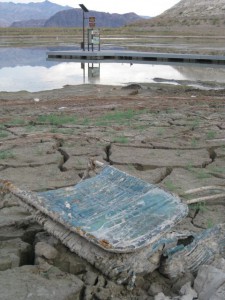So the folks at Island Press will be publishing my book, tentatively titled Beyond the Water Wars, about the problems facing the Colorado River Basin and how we might fix them. I couldn’t be happier.
Its basic themes will be familiar to readers of this blog – the end of the age of fat reservoirs and full canals, of vast suburban lawns and alfalfa fields stretching as far as the eye can see; the growing but uncertain shift away from legal confrontation, toward collaborative arrangements to share; the risks of the system crashing if we fail to pull off that shift.
We don’t have a firm schedule yet, but it looks like publication is a couple of years away. (Very different from the publication pace of my newspaper life.)
I’m excited to work with Island Press. The people I’ve been dealing with in developing the project have been extraordinarily smart about helping me think through how I might turn my sometimes mushy ideas into a readable and therefore useful book. Now it’s on me to write that book. A lot of it will be based on work I’ve done over a number of years, and I plan to spend the next year doing a lot of fresh research and reporting. (Alfalfa fields, stranded boat ramps, suburban fountains. Road trips!)
I can still vividly remember standing on the south rim of the Grand Canyon as a little boy (I think I was five), looking down in awe at the river below. If you’ve been there, you understand that you get only glimpses, tiny bits of the brown ribbon peeking into view, a river obviously there (witness the gaping hole it created) but elusively out of a little kid’s view.
Years later when I boated the Grand Canyon, I realized that it’s the same way looking up from the river. Often you can’t see the rim, can’t see out of the marvelous canyon you’re in. (Metaphor alert.)
I’ve been on and around and thinking about the river ever since, and have wanted to write about it since I was grown enough to want to write about things. But I don’t think I understood what the story was until the spring of 2010, when Jennifer McCloskey, then of the Bureau of Reclamation’s Yuma office, sent me off driving down the levee road behind the Bureau’s Yuma headquarters. A couple of miles downstream from her office, what’s left of the river hits Morelos Dam and the Colorado River ends. By that time I was already deep into the politics and policy side of the thing, trying to make sense of what we had done and might do with the Colorado. But nothing quite prepared me for seeing this river I’d been so obsessed with my whole life simply stop.


Excellent news John, and congratulations! Your incredible work in this space has been admirable and necessary, and I look forward to seeing the fruits of this new endeavor (and the progress you make along the journey).
And you will reside in the Island Press publishing house alongside the gerats like Peter Gleick and Wendell Berry. A fitting home for you John.
much love and respect John.
safe journeys.
Congratulations on your book deal! Looking forward to the book.
Sterling Grogan
Congrats to you! Looking forward to the read.
Congrats, John! That’s very cool!
Congrats John.
Excellent news.
Congratulations, John!
Pingback: In California drought, when the water’s not fer fightin’ over | jfleck at inkstain
Pingback: If you read two books about the West’s water problems, one of them probably shouldn’t be Cadillac Desert. | jfleck at inkstain
Pingback: "How's the book going?" - jfleck at inkstain